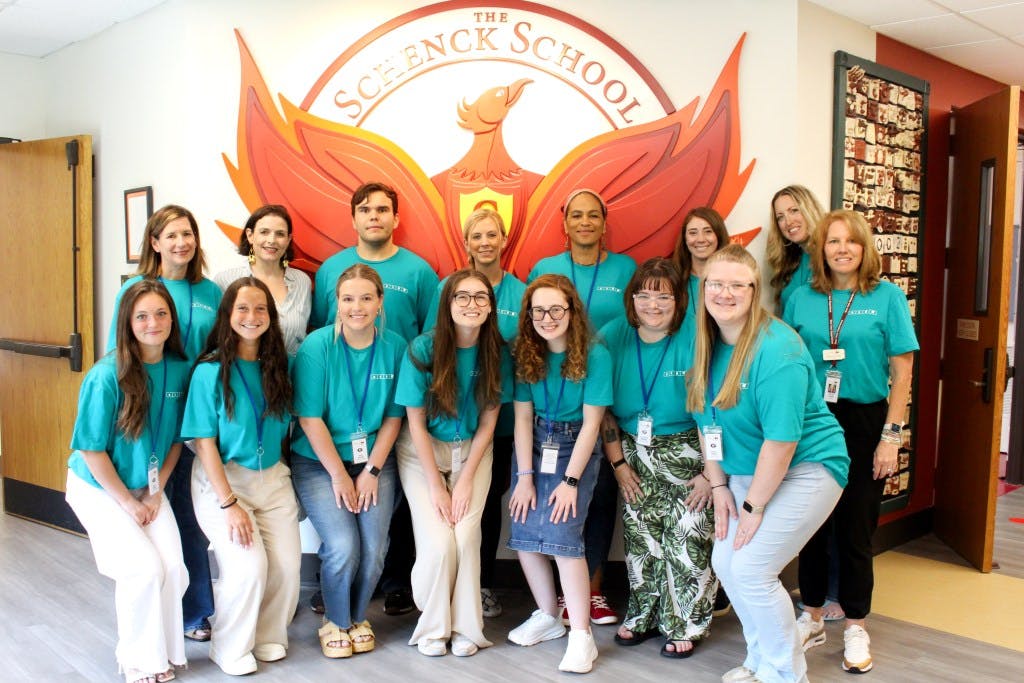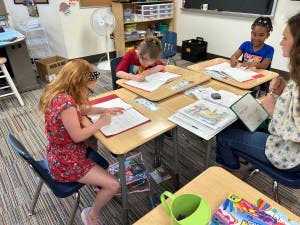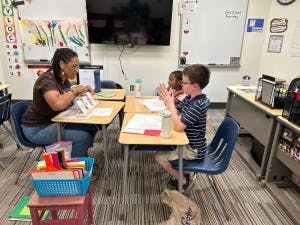It’s a mutually beneficial partnership—young pupils receive free tutoring for four weeks during the summer, while students at the University of Georgia receive hands-on clinical training in early literacy interventions for children with reading difficulties and disabilities.
In collaboration with the Schenck School/ReadSource in Atlanta, 10 students in the Mary Frances Early College of Education are providing high-quality reading interventions for over 30 students in grades 1-3 in the Atlanta area.

“We have two goals for the project, and one is to enhance the training of students who are going through our Dyslexia Endorsement and Certificate program,” said Kristin Sayeski, associate professor in the Department of Communication Sciences and Special Education. “The other aim is to improve literacy outcomes in young children with reading disabilities.”
Funded by the Sandra Dunagan Deal Center for Early Language and Literacy, the project also serves as a research study that will assess early literacy and language outcomes of student participants in a variety of skills, including reading, spelling, vocabulary, and writing.
Additionally, Sayeski, along with co-principal investigator and assistant professor Kelly Williams, will examine the impact of the program on teacher candidates.
“Most of these young kids either have a diagnosis of dyslexia, or they’ve already been identified as at risk and are struggling with learning to read,” said Sayeski. “As such, the most exciting part of this project is to see the translation of what our dyslexia endorsement students have been learning in our program and then getting to see them implement and practice with young students in real time.”
In addition to the endorsement’s curricula and coursework, remediation specialists from ReadSource—a non-profit organization founded by the Schenck School—partnered with UGA to provide three days of intensive training and coaching to UGA students, offering them further instruction on how to work with children on literacy and comprehension.
“Although the program is only for June, I hope that the children participating in the UGA-Schenck Summer Literacy Program will progress in their ability to decode and encode words and feel successful when they read and write,” said Jen Burch, director of academic programs at the Schenck School/ReadSource.
Practice makes perfect
Elementary education student Anna Boswell and special education student Victoria Vesely share a passion for reading, literacy, and helping students learn new concepts.

As participants of the summer literacy program, Boswell and Vesely received hands-on training in high-quality reading instruction and intervention for children with reading and learning disabilities.
“Tutoring young students as part of this partnership has drastically increased my hands-on knowledge of the structured literacy method,” said Vesely. “Working with a ReadSource specialist has helped me to ensure that I’m making the best decisions for my students’ learning. They not only want students to succeed in literacy acquisition, but they also want me to succeed in my own goals to become the best educator I can be.”
UGA students are focused on helping pupils develop both their reading and language comprehension, spending about an hour on phonics instruction, spelling, and word recognition. Code-based skills help students master the mechanics of reading, including the ability to automatically match letters to their respective sounds when reading.

“In just a few weeks, I have seen students make great progress from receiving explicit instruction in decoding and language comprehension,” said Boswell. “Learning how to teach students and receiving feedback and professional development from trained specialists added so much to my ability to teach structured literacy lessons.”
The second and final hour of tutoring is spent on reading and discussing fables, during which students practice their handwriting and vocabulary, as well as sentence-level writing. Some of these fables include, “The Boy Who Cried Wolf,” “The Milkmaid and Her Pail,” “The Goose that Laid the Golden Eggs,” and more.
“This program is a win-win,” said Burch. “Not only are the children building confidence and becoming more motivated to read independently, but the UGA students facilitating the tutoring sessions are applying what they have been taught in their classes and are gaining valuable practical experience in the classroom which they would not otherwise have received.”
